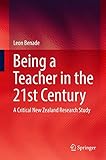Being A Teacher in the 21st Century [electronic resource] : A Critical New Zealand Research Study / by Leon Benade.
Material type: TextPublisher: Singapore : Springer Singapore : Imprint: Springer, 2017Description: XI, 211 p. 7 illus. online resourceContent type: text Media type: computer Carrier type: online resourceISBN: 9789811037825Subject(s): Education | International education | Comparative education | Educational technology | Teaching | Education | Teaching and Teacher Education | Educational Technology | International and Comparative EducationAdditional physical formats: Printed edition:: No titleDDC classification: 370.711 LOC classification: LB1024.2-1050.75LB1705-2286Online resources: e-book Full-text access
TextPublisher: Singapore : Springer Singapore : Imprint: Springer, 2017Description: XI, 211 p. 7 illus. online resourceContent type: text Media type: computer Carrier type: online resourceISBN: 9789811037825Subject(s): Education | International education | Comparative education | Educational technology | Teaching | Education | Teaching and Teacher Education | Educational Technology | International and Comparative EducationAdditional physical formats: Printed edition:: No titleDDC classification: 370.711 LOC classification: LB1024.2-1050.75LB1705-2286Online resources: e-book Full-text access | Item type | Current library | Collection | Call number | Copy number | Status | Notes | Date due | Barcode |
|---|---|---|---|---|---|---|---|---|
| E-Books | MEF eKitap Kütüphanesi | Springer Nature | LB1024.2 -1050.75 (Browse shelf (Opens below)) | Available | NATURE | 1419824-1001 |
Chapter 1 Introduction -- Chapter 2 Presenting the research -- Chapter 3 The future is now: What '21st-century learning' means for teaching -- Chapter 4 The impacts on teachers' work: 21st-century learning -- Chapter 5 The impacts on teachers' work: Working in Flexible Learning Environments -- Chapter 6 The impacts on teachers' work: ICT/BYOD and digital pedagogy -- Chapter 7 The impacts on teachers' work: Practitioner attitudes and reflective transitions -- Chapter 8 Responding to 21st-century learning policy demands -- Chapter 9 Lessons to be learned?.
This book provides scholars, teacher educators, as well as reflective school leaders and teachers with valuable insights into what it is to be a teacher in the 21st century. It does so by presenting original research based on a study of several New Zealand schools between 2013 and 2015, and in particular, a focussed study of four of those schools in 2015. The book draws on the findings to take stock of some of the central manifestations of 21st-century learning, especially digital pedagogies and the collaborative practices associated with teaching and learning in modern learning environments. It reflects on the mental shifts and sometimes-painful transitions teachers and leaders are making and experiencing as they enter uncharted waters, moving from traditional classroom practices to ones that emphasise collaboration, teamwork and the radical de-centring of their personal roles. It outlines a blueprint for understanding how to navigate these changes, and describes and explains the nature of pedagogical shifts apparent in digital classrooms and modern learning environments.
5
